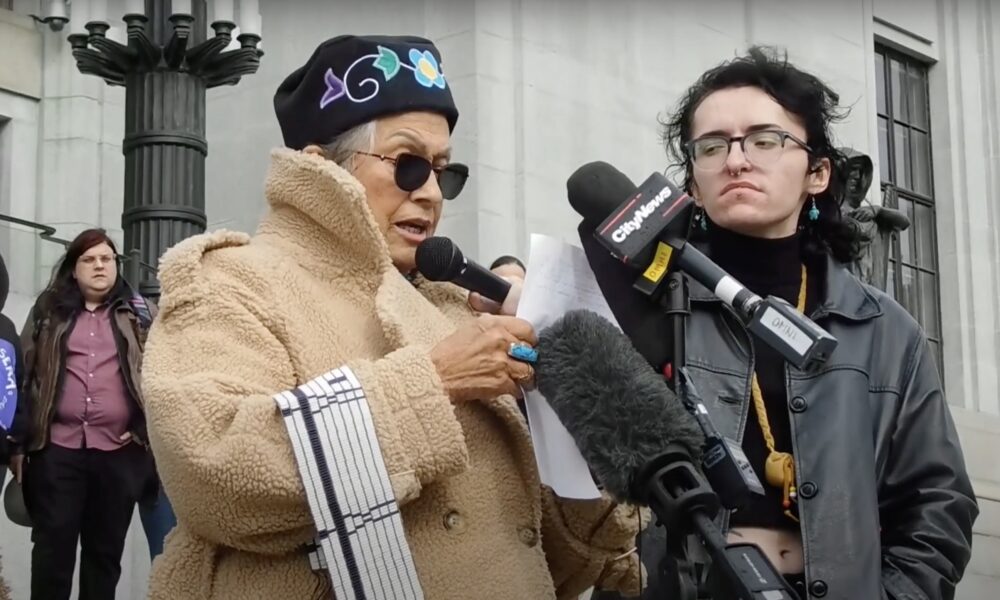On Oct. 15, the Kanien’kehá:ka Kahnistensera (Mohawk Mothers) filed a motion with the Supreme Court of Canada seeking an independent investigation into possible unmarked graves at the site of McGill’s New Vic Project at the former Royal Victoria Hospital (RVH).
“We stand in front of the Supreme Court of Canada facing a political violation by the people of Canada that we wish to discuss so that we may get justice,” said Mohawk Mother Kahentinetha at a press conference outside the Court in Ottawa.
McGill’s New Vic Project, a plan to expand the downtown campus, will occupy 15 per cent of the former RVH site, the rest of which is managed by the Société québécoise des infrastructures (SQI). During the 1950s and 1960s, the RVH’s Allan Memorial Institute was one of many sites across North America on which the CIA conducted MK-ULTRA mind control and chemical interrogation experiments. The Mohawk Mothers believe that the site houses both ancestral burials that predate colonization and unmarked graves from the CIA’s experiments, which they allege disproportionately targeted Indigenous peoples. Since 2015, the Mohawk Mothers have been advocating against construction and excavation until a comprehensive investigation into possible unmarked graves is completed.
Karonhia’no:ron, a graduate student at McGill and cultural monitor for the Mohawk Mothers, called on McGill and the Quebec government to prioritize reconciliation over construction at the press conference.
“Perhaps it was naïive of me to believe that my university and the province of Quebec would agree that protecting Indigenous children was more important than a campus redevelopment project,” said Karonhia’no:ron.
In April 2023, the Mohawk Mothers reached a settlement agreement with McGill, the SQI, the RVH, the City of Montreal, and the Attorney General of Canada, which mandated that a panel of archaeologists jointly appointed by all parties immediately begin archival, testimonial, and archaeological investigations into the site. The Mohawk Mothers allege that McGill disbanded the panel in August 2023, before the investigation had been completed. However, in a statement to The Tribune McGill’s Media Relations Office (MRO) asserted that the panel dissolved after they fulfilled their mandate by completing their investigation and issuing their final report in July 2023. The MRO maintains that no unmarked graves “have been made” on the site and that all archaeological work is being done in accordance with the settlement agreement and the recommendations of the panel.
The Mohawk Mothers argue that there is evidence of unmarked graves on the site that necessitate further investigation. At the press conference, Kwetiio, one of the Mohawk Mothers, explained that in June 2023, historic human remains detection dogs detected the scent of potential human remains near Hersey Pavilion. Ground-penetrating radar surveys then revealed dozens of anomalies, as announced by Provost and Executive Vice-President (Academic) Christopher Manfredi on Aug. 3, 2023.
Kimberly Murray, a member of the Kanehsatà:ke Mohawk Nation and the Independent Special Interlocutor appointed by the Minister of Justice and Attorney General of Canada, voiced her solidarity with their motion to the Supreme Court at the press conference on Tuesday. Murray, who is responsible for making recommendations to improve Canada’s legal processes to help identify and protect the unmarked graves and burial sites associated with residential schools, emphasized that Canada’s legal system continues to fail the Mohawk Mothers and other Indigenous communities.
“Canadian law has been used to oppress Indigenous people for decades. The [Truth and Reconciliation Commission] has said that the law has operated to stop the truth from coming out,” Murray said. “So I support this appeal. It’s of national importance.”
In November 2023, Justice Gregory Moore ruled to reinstate the panel of archaeologists, asserting that their mandate had not been completed in July as McGill argued. However, McGill successfully appealed this decision at Quebec’s Court of Appeal this August.
By submitting an application to appeal to the Supreme Court, the Mohawk Mothers are hoping to reverse the Quebec Court of Appeal’s decision and reinstate the panel of archaeologists to oversee the investigation. According to the Mohawk Mothers, this represented the first time that traditional Kanien’kehá:ka legal documents were submitted to the Supreme Court.
Kwetiio underlined that Canada must reckon with the genocide it has committed against Indigenous peoples before reconciliation can be pursued in good faith.
“Truth comes before reconciliation,” Kwetiio said. “We hope that Canadians and their Supreme Court will see that.”







